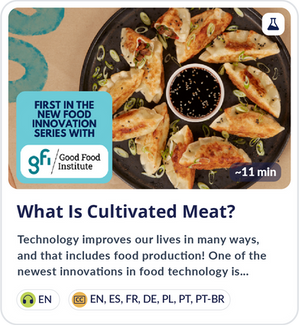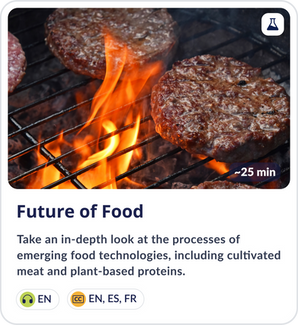A Breakdown of Precision and Biomass Fermentation in Cow-Free Dairy and Fermentation-Enabled Protein Production.
- Maddison Chaffin
- Jan 30
- 2 min read

As demand for dairy-free and animal-free products continues to rise, innovations in food technology offer new ways to meet consumer demands without relying on traditional animal farming, like precision and biomass fermentation. Precision fermentation focuses on recreating specific ingredients (e.g., dairy proteins), while biomass fermentation excels at producing whole-food protein alternatives in bulk.
"With fermentation, we are able to create proteins that mimic those found in animal products, allowing us to produce familiar dairy items without the environmental and ethical concerns associated with animal agriculture," says a representative from the Good Food Institute.
The processes, applications, and benefits of precision and biomass fermentation are discussed in detail in the Educated Choices Program and Good Food Institute's "What is Cow-Free Dairy" video presentation.
What is Precision Fermentation?
Precision fermentation involves engineering microorganisms, such as yeast or fungi, to produce specific compounds, including dairy proteins, vitamins, or fats. "Cow-free dairy," a product made through precision fermentation, is complete with genuine dairy proteins like whey and casein without a need for traditional bovine farming. This highly targeted approach has applications ranging from food to medicine, where precision is critical to replicating specific proteins found in nature.

What is Biomass Fermentation?
Biomass fermentation leverages the natural ability of microorganisms, often fungi or algae, to rapidly grow and produce a mass of cells rich in nutrients. Instead of extracting specific molecules, this method uses the entire biomass as a food product. Biomass Fermentation is efficient, making it ideal to produce protein-rich foods on a large scale. However, the process lacks the precision to replicate complex molecules like dairy proteins.

How Will Precision and Biomass Fermentation Help Create a Sustainable Food System?
By leveraging microorganisms, the food industry is reimagining popular animal product production in a way that's better for planetary and human health. Beyond environmental benefits, fermentation-enabled proteins also address rising concerns about public health since zoonotic disease and antibiotic risks are minimized by avoiding traditional mass farming practices.
Expand Your Knowledge with the Educated Choices Program
Do you want to learn more about the environmental, health, and societal applications of cow-free dairy and other fermentation-enabled proteins? Explore the Educated Choices Program and Good Food Institutes "Food Innovation Series" including:
Further your knowledge of alternative proteins with the Educated Choices Program Library: learnecprogram.org.








Comments